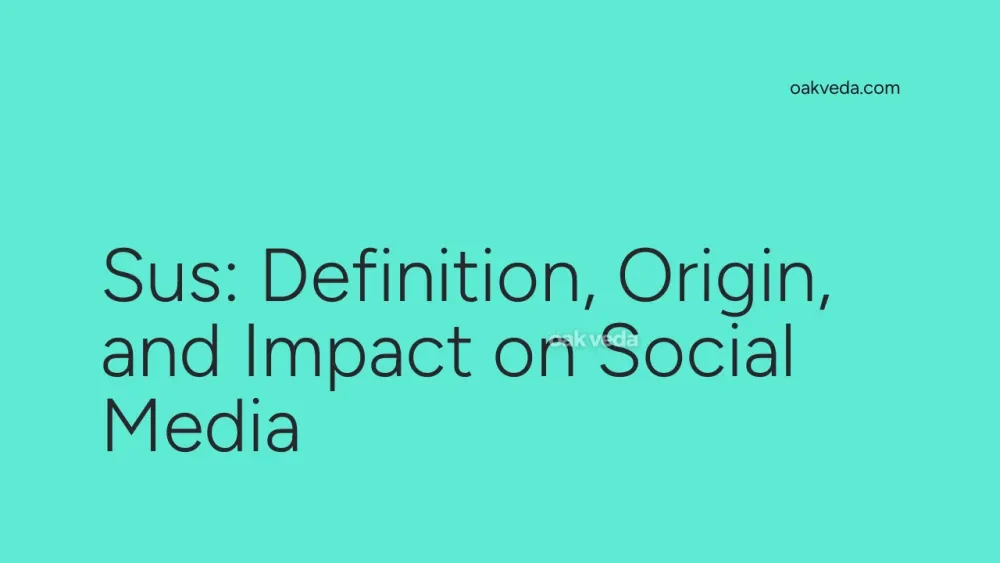
What is Sus?
"Sus" is a popular slang term used extensively on social media platforms and in online gaming communities. It's an abbreviation of "suspicious" or "suspect," typically employed when someone or something seems questionable, untrustworthy, or out of place. The term has become a cornerstone of internet culture, allowing users to quickly express doubt or skepticism in various online interactions.
Origin and Development of Sus
While the term "sus" has been part of colloquial language for decades, its rise to prominence in social media circles is relatively recent. The abbreviation gained significant traction in 2018 but exploded in popularity in 2020 with the release of the online multiplayer game "Among Us."
In "Among Us," players must identify impostors among their crew, leading to frequent accusations and the liberal use of "sus" to call out suspicious behavior. This game-driven popularity catapulted the term into mainstream social media usage, transcending its gaming origins.
How Sus Works in Social Media Conversations
On social media platforms, "sus" functions as a versatile expression of doubt or suspicion. Users often employ it in the following ways:
- As a standalone comment: "Sus" or "That's sus"
- In longer sentences: "Your story sounds kinda sus, not gonna lie"
- As a hashtag: #sus
The term's brevity and adaptability make it ideal for quick reactions in fast-paced online conversations, particularly on platforms like Twitter, TikTok, and Instagram.
Popular Examples of Sus Usage
-
Reaction to unlikely stories: When someone shares an improbable tale, commenters might respond with "sus" to express their disbelief.
-
Calling out potential fake news: Users might label suspicious-looking headlines or articles as "sus" to warn others about potential misinformation.
-
Playful accusations: Friends often use "sus" in a lighthearted manner to tease each other about questionable decisions or statements.
-
Memes and viral content: "Sus" has become a popular element in memes, often featuring characters from "Among Us" or other pop culture references.
Impact of Sus on Social Media Culture
The widespread adoption of "sus" has significantly influenced online communication patterns:
-
Brevity in expression: "Sus" encapsulates a complex emotion or reaction in a single, short word, aligning with the trend towards more concise online communication.
-
Community building: The term serves as a sort of in-group marker, with its usage signaling familiarity with current internet culture.
-
Humor and levity: "Sus" often introduces an element of playfulness into conversations, even when discussing serious topics.
-
Critical thinking: The popularity of "sus" may encourage users to approach online content with a more critical eye, promoting healthy skepticism.
Controversies Surrounding Sus
While "sus" is generally seen as a harmless slang term, it has faced some criticism:
-
Overuse: Some argue that the term's ubiquity has led to it losing its impact or becoming annoying.
-
Misuse in serious contexts: There are concerns about "sus" being used to dismiss legitimate issues or accusations without proper consideration.
-
Generational divide: Older internet users or those unfamiliar with gaming culture may find the term confusing or exclusionary.
How Brands and Influencers Use Sus
Savvy brands and influencers have incorporated "sus" into their social media strategies:
-
Engagement bait: Brands might use "sus" in posts to appear trendy and encourage user interaction.
-
Meme marketing: Companies create or share memes featuring "sus" to resonate with younger audiences.
-
Product promotion: Some brands playfully label their competitors' products as "sus" while promoting their own as trustworthy alternatives.
-
Influencer authenticity: Influencers might use "sus" to call out fake or sponsored content, positioning themselves as more authentic and trustworthy.
Future Trends Related to Sus
As with many internet slang terms, the future of "sus" is difficult to predict. However, some potential trends include:
-
Evolution of meaning: The term may develop new nuances or applications beyond its current usage.
-
Integration into mainstream language: "Sus" might find its way into more formal contexts or even traditional media.
-
Decline in popularity: As with many viral terms, "sus" could eventually fall out of favor as newer slang emerges.
-
Cultural variations: Different online communities might develop unique ways of using or interpreting "sus."
FAQs about Sus
-
Is "sus" only used in gaming contexts? No, while it gained popularity through gaming, "sus" is now widely used across various social media platforms and contexts.
-
Can "sus" be used as a verb or adjective? Yes, people sometimes use it as an adjective ("That's a sus move") or even a verb ("I'm sussing out the situation").
-
Is "sus" considered offensive? Generally, no. It's typically used in a playful or casual manner. However, context is important, as it can be used to dismiss or invalidate others.
-
How do you pronounce "sus"? It's pronounced like the first syllable of "suspicious" - /sʌs/ in IPA notation.
-
Will "sus" remain popular in the future? While it's currently very popular, the longevity of internet slang terms can be unpredictable. Only time will tell if "sus" remains a staple of online communication.
In conclusion, "sus" has become a significant part of social media lexicon, shaping how users express doubt, engage in playful banter, and react to online content. Its journey from gaming slang to widespread usage illustrates the dynamic nature of internet culture and language evolution in the digital age.
You may be interested in:
- OpenAI: Definition, Origin, and Impact on Social Media
- Conversion: Definition, Origin, and Impact in Social Media
- Filter: Definition, Origin, and Impact on Social Media
- Swiftie: Definition, Origin, and Impact on Fan Culture
- Rizz: Definition, Origin, and Impact on Social Media Culture
- Inbound Marketing: Definition, Origin, and Impact

